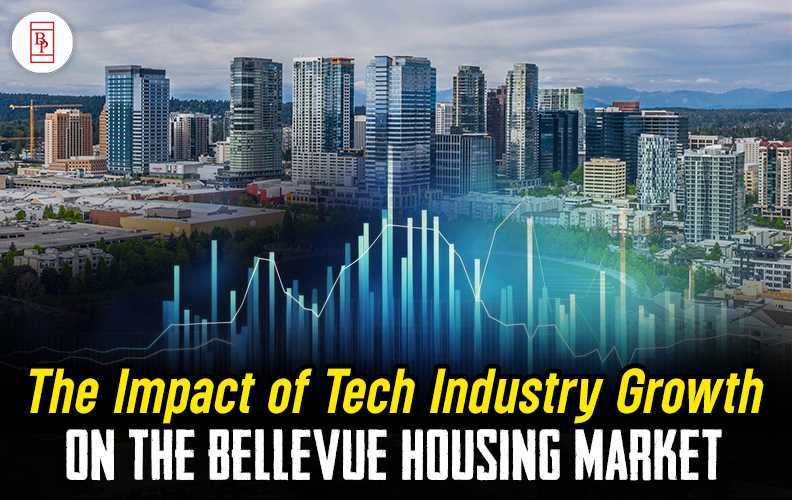The Impact of Tech Industry Growth on the Bellevue Housing Market


The city of Bellevue, Washington, has experienced significant transformations over the past few decades, largely driven by the rapid growth of the tech industry. This growth has had profound effects on various aspects of the city, particularly the Bellevue housing market. In this article, we will explore how the expansion of the tech sector has influenced the Bellevue real estate market, examining both the positive and negative impacts, and what the future might hold for this dynamic city.
The Rise of Bellevue as a Tech Hub
Bellevue's evolution into a tech hub began in earnest in the late 20th century, with the establishment of major tech companies in the region. The presence of Microsoft in nearby Redmond played a pivotal role in attracting other tech firms to the area. Over time, Bellevue has become home to numerous tech giants, including Amazon, T-Mobile, and Expedia, among others. This influx of tech companies has brought a substantial number of high-paying jobs to the city, contributing to its economic prosperity.
Economic Prosperity and Its Effects on the Housing Market
The growth of the tech industry has significantly boosted Bellevue's economy. High-paying tech jobs have increased the purchasing power of many residents, leading to a surge in demand for housing. This heightened demand has had several notable effects on the Bellevue housing market:
1. Rising Home Prices:
One of the most apparent impacts of the tech industry's growth is the sharp increase in home prices. The Bellevue real estate market has seen home values soar as tech employees seek to live close to their workplaces. According to recent data, the median home price in Bellevue has risen dramatically over the past decade, making it one of the most expensive housing markets in the United States.
2. Increased Rental Rates:
The demand for housing has not only driven up home prices but also rental rates. Many tech workers, especially those who are new to the area, opt to rent rather than buy. This surge in demand for rental properties has led to higher rental prices, making it challenging for non-tech workers and lower-income residents to find affordable housing.
3. Development of Luxury Housing:
To cater to the affluent tech workforce, developers have focused on building luxury housing units. High-end condos and apartments with state-of-the-art amenities have become a common sight in Bellevue. While this has provided more options for well-paid tech employees, it has also contributed to the overall increase in housing costs.
Challenges and Concerns
While the growth of the tech industry has brought economic prosperity to Bellevue, it has also created several challenges and concerns related to the housing market:
1. Affordability Crisis:
The rapid rise in home prices and rental rates has led to an affordability crisis in Bellevue. Many long-time residents and non-tech workers need help to afford housing in the city. This has resulted in a growing wealth gap and concerns about the displacement of lower-income residents.
2. Limited Housing Supply:
The surge in demand for housing has outpaced the supply, leading to a shortage of available homes. This scarcity has further driven up prices and made it challenging for prospective buyers to find suitable properties. The limited housing supply has also put pressure on the rental market, exacerbating the affordability issue.
3. Traffic and Infrastructure Strain:
The influx of tech workers has increased the population density in Bellevue, putting a strain on the city's infrastructure. Traffic congestion has become a significant concern, as more people commute to and from work. The city has had to invest in infrastructure improvements to accommodate the growing population, but these efforts have not always kept pace with the rapid growth.
Efforts to Address Housing Challenges
Recognizing the challenges posed by the tech industry's growth, the city of Bellevue and various stakeholders have undertaken several initiatives to address the housing market issues:
1. Affordable Housing Programs:
The city has implemented affordable housing programs to provide options for lower-income residents. These programs aim to create more affordable housing units and offer financial assistance to those in need. However, the demand for affordable housing still far exceeds the supply.
2. Zoning and Land Use Changes:
To increase the housing supply, Bellevue has made changes to its zoning and land use policies. These changes encourage higher-density development and the construction of multi-family housing units. By allowing for more housing units to be built, the city hopes to alleviate some of the pressure on the housing market.
3. Public-Private Partnerships:
Collaboration between the public and private sectors has been crucial in addressing housing challenges. Developers, tech companies, and the city government have worked together to create innovative solutions, such as mixed-use developments that combine residential, commercial, and recreational spaces.
The Future of the Bellevue Housing Market
Looking ahead, the Bellevue housing market is likely to continue evolving in response to the tech industry's growth. Several trends and factors will shape the future of the Bellevue real estate market:
1. Sustainable Development:
As the city grows, there will be an increasing focus on sustainable development practices. Green building standards, energy-efficient designs, and environmentally friendly infrastructure will become more prevalent. These efforts will not only benefit the environment but also enhance the quality of life for residents.
2. Remote Work and Hybrid Models:
The COVID-19 pandemic has accelerated the adoption of remote work and hybrid work models. This shift may impact the Bellevue housing market by reducing the demand for housing near tech company offices. Some tech workers may choose to live in more affordable areas further from the city center, potentially easing some of the pressure on the housing market.
3. Technological Innovations:
The tech industry's influence on the housing market extends beyond demand. Technological innovations, such as smart home technology and advanced construction methods, will continue to shape the real estate market. These innovations can improve the efficiency and sustainability of housing developments.
4. Community Engagement:
The involvement of the community in shaping the future of Bellevue's housing market will be crucial. Residents, local organizations, and policymakers will need to work together to find balanced solutions that address affordability, sustainability, and quality of life.
Wrapping it up
The growth of the tech industry has undeniably transformed the Bellevue housing market Forecast. While it has brought economic prosperity and development to the city, it has also created significant challenges related to affordability and housing supply. Addressing these challenges requires a multifaceted approach, involving collaboration between the public and private sectors, innovative solutions, and a commitment to sustainable development.
As Bellevue continues to evolve as a tech hub, the future of its housing market will depend on how effectively the city can balance the needs of its diverse population. By prioritizing affordability, sustainability, and community engagement, Bellevue can ensure that its housing market remains vibrant and inclusive for all residents.
